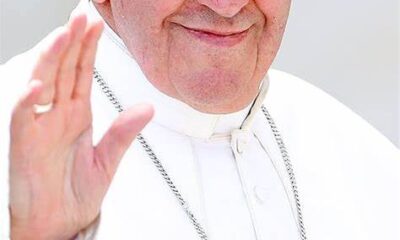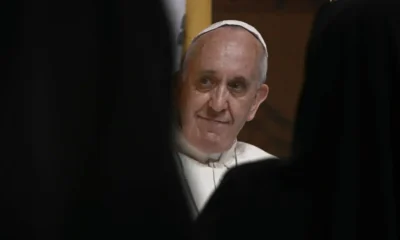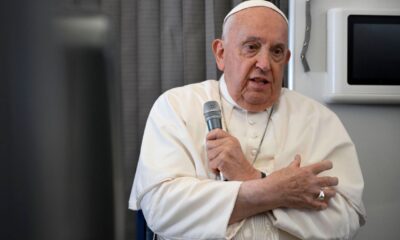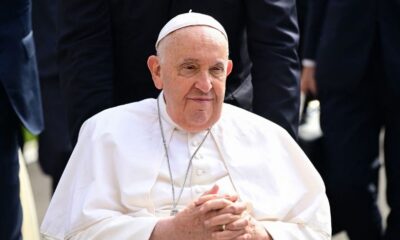Religion
Pope ‘sleeps all night’ after having two breathing attacks: Vatican.

Vatican Pope Francis arrives in Paul-VI hall for a weekly general audience in The Vatican on February 5, 2025. After 88 years of tough battle against pneumonia, the Vatican announced on March 4, 2025, Pope Francis “slept all night”.
The Vatican on March 4 announced that Pope Francis, who slept “all night long”, was recuperating in a hospital where he was receiving attention for pneumonia. The 88-year-old Pope has reported of suffering from two bouts of acute respiratory failure.
The pope, who has been admitted in hospital bed with pneumonia in both of his lungs, slept “all night long and continues to rest”, according to official statement released Tuesday by Vatican.
The 88-year-old pontiff came to the ICU at Gemelli hospital on 14 February because of bronchitis that later turned into pneumonia for both lungs and alarmed the whole world.
Provided Monday, the Pope had “two episodes of acute respiratory failure, caused by significant accumulation of endobronchial mucus and consequent bronchospasm,” the Vaticans had said in an evening update.
Acute respiratory failure is defined as a situation where the lungs fail to oxygenate the blood and where carbon dioxide builds up within the body. It can also become deadly.
This means that Francis’s prognosis remains “reserved”, meaning the clinical outcome is not predictable.
The Jesuit is being treated at the tenth floor of Gemelli where it’s reserved for pontiffs on a special suite. According to the Vatican, he continues to work at this location.
Francis, also known as Jorge Bergoglio, missed his Sunday Angelus prayers again for the third week running and had the Vatican produce a written one instead.
In it, the pontiff said he would continue to bless well-wishers because “I almost feel as if I’m carried and propped up by all God’s people in this extraordinary moment.”
Religion
World Communication Day : Shun Prejudice, Anger in your Reports.- Bishop Kiagama
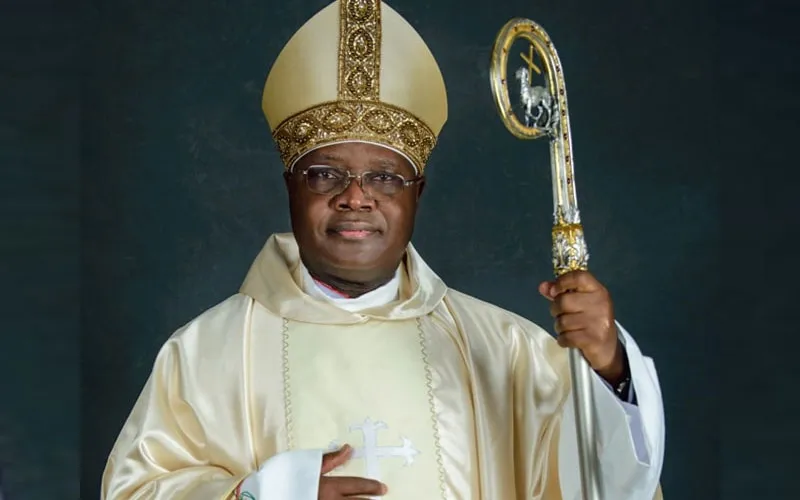
HOMILY BY ARCHBISHOP I.A. KAIGAMA. 2025 WORLD COMMUNICATIONS DAY, at St. EDWIN’S PARISH, TUTU KUBWA, ABUJA.
I am happy to be in your parish today dear Fr. Francis Nwora and the good people of St. Edwin Kubwa, to pray with you, to encourage you in your faith and love for one another, and to administer the sacrament of confirmation to children and church members.
The communication commission of the Archdiocese is here with us to celebrate World Communications Day in your parish.
The 59th World Communications Sunday had its theme chosen by the late Holy Father, Pope Francis: “Share with gentleness the hope that is in your hearts” (cf. 1 Peter 3:15-16).
Recently, speaking to thousands of reporters, radio and television correspondents, photographers, and camera operators, Pope Leo XIV asked them to be peacemakers by shunning prejudice and anger in their reporting.
On World Communications Day, we are called to remember that in today’s world of imagery, the mass media have effectively become an extraordinary resource for promoting solidarity and understanding within the human family. See the vibrant way the death and solemn funeral rites of our late Pope Francis were reported all over the world and how equally, the inaugural Mass of the papacy of Pope Leo XIV dominated world news headlines. However, the media must be used “with gentleness and reverence”.
We live in an age of powerful technologies — of digital voices, social media, and instant messages. But we must ask: Are we communicating truth? Are we promoting understanding and unity? Are we forming human hearts?
Those of you in the communication business, could you take a little time this year to highlight the severe consequences of brain drain in Nigeria, particularly of healthcare professionals, with an estimated 16,000 doctors said to be leaving the country in the past seven years to the UK, US, Canada, and Germany, where thousands of Nigerian doctors are already practicing.
Not to talk of thousands of other skilled Nigerian personnel outside the country. Does it worry our government when skilled people, seeking to leave Nigeria or have already permanently left Nigeria complain of inadequate working conditions and low salaries, lack of motivation, absence of professional tools, and insecurity, as reasons for seeking opportunities abroad?
The Church is reminding all believers of the call to “communicate truth with love,” as St. Paul urged (Ephesians 4:15), and to use every tool at our disposal to share the hope that is in our hearts, while being mindful of the impact of artificial intelligence, the dangers of fake news and misinformation. We should not be too quick to spread bad news. Let us remember, that over and above all, we are called to be ambassadors of the gospel of Jesus, and the gospel is good news.
Let the social media be marked by decency and witness. Let your words heal, not wound. Let your messages bring hope, not fear, contribute to bringing down the walls of hostility that continue to divide humanity, and strengthen the bonds of friendship and love which are signs of God’s Kingdom in history.
Always ensure objectivity and respect for human dignity. When you read your funeral on social media or stories that are fabricated to make headlines or to get likes on Facebook and other platforms, they are far from being intended to edify or bring peace or development. Use rather, the modern means of modern communication to edify, to motivate, to instruct, to correct, to inspire, to promote unity and harmony.
Dear friends, today, we are presented with an important prayer that the world needs at this time, not only the Church but also the whole world, the Jesus’ Prayer. It is a prayer that looks to the present and to the future. It is a prayer that focuses on unity, on all being one; how we are to live our lives together. It is very clear that Jesus’ words are meant for us now, but also for those who don’t even believe in Him and “those who will believe” (cf. Jn 17:20).
Jesus prays that “all may be one.” This means that there are to be no solitary Christians or spiritual “Lone Rangers.” That we should be one, as He and the Father are one. That was His last desire before going to the cross. He wants the Church to be united, not scattered; a family, not a crowd. And so, He devotes the entire chapter 17 of John’s Gospel to praying for His disciples and would-be disciples, His longest prayer. And what is the object of this prayer? Unity.
Be one in worship. Be one in service. Be one across age, background, and status. Let there be no room for factions or rivalries. Let St. Edwin Parish be known as a community where everyone belongs and Christ is at the center. Be united in worship. Be united in mission. Be united in love.
Avoid factions and bitterness. Learn to forgive. Speak the truth, but always with charity. A divided Church cannot speak convincingly to a divided world. But a united Church becomes a sign of the Kingdom. Strive to be a community of unity. Let your diversity enrich, not divide. Avoid gossip and resentment. Seek reconciliation quickly. In a world torn apart by conflict, a united church is a powerful testimony.
Praying that “all may be one,” does that mean we all have to get along all the time, agree all the time, or have the same political views all the time? As Christians, whether we agree with each other or not, like one another or not, we are called to be one in Christ. To become a part of Christ is to become a part of the community; a part of the one.
As members of the vast family of over two hundred million people called Nigeria, we must realize that unity and harmony is a community project, to live and behave in a manner that we function like the parts of the human body that function individually but for the good of the whole body. In 1 Corinthians 12:21 we read that “the eye cannot tell the hand, ‘I do not need you’ nor the head tell the feet, ‘I do not need you.’”
Unity is not the absence of differences – it is the triumph of love over division; tolerance, not confrontation. Let us pray for real unity in this country, not the shallow unity of diplomacy, but the deep unity of sanctity as preached by our two major religions.
Today, your parish marks 10 years of your creation and I learned that your parish priest marked his 10th priestly anniversary recently. Today, you are opening your newly completed rectory and 108 of your parishioners will be confirmed. A big congratulations to you on these great achievements.
In the first reading from the Acts of the Apostles, we witness the martyrdom of Stephen, a man filled with the Holy Spirit. Having witnessed the ascension of the Lord and taking seriously, Jesus’ command to be His witnesses to the rest of the world, Stephen courageously bears witness to Christ.
Thus, confronted with fierce opposition, he remains steadfast in his faith. His courage and unwavering commitment to Christ, even in the face of persecution, remind us of the profound strength that comes from living in communion with the risen Lord. This is the kind of Church Christ desires – a Church of bold witnesses.
To our Confirmation candidates, today is a defining moment. The same Spirit that filled Stephen is about to descend upon you. You are not just receiving a sacrament – you are being empowered, sealed, and sent. Confirmation makes you spiritual adults in the Church, soldiers of the Church, capable of standing up for your faith, witnessing with your lives, and serving with joy.
Our world needs young people who are not ashamed of the Gospel – who are not afraid to live differently, to speak boldly, and to love generously. The Spirit you receive today will give you wisdom, courage, and strength – but you must cooperate with Him. Be open. Be prayerful. Be missionary.
And to the parents and sponsors: today, your role does not end – it continues. Walk with these young people. I always encourage that each candidate has his/her sponsor. It is very important. Sponsors, you are meant to teach them by example. Remind them that the Spirit of God is a gift not just to feel, but to follow.
As we await the outpouring of the Holy Spirit at Pentecost, let us continue to spread the message of hope, love, and unity everywhere we find ourselves as Nigerians. There is no way you will love a fellow Nigerian and still kidnap him/her to demand ransom. Ethnic tensions and farmer-herder fights grow as a result of a lack of love for our neighbors. Community clashes spiral because we hold grudges. Poverty and insecurity persist because corruption continues to receive new oxygen from both higher and lower places.
May the Holy Spirit help us to be open to overhauling our social and inner life, embracing love, and hard work; ensuring justice for all Nigerians; and embracing honesty, and not corruption as a way of life.
News
Pope Leo XIV Welcomes US Vice President Vance and Secretary of State Rubio
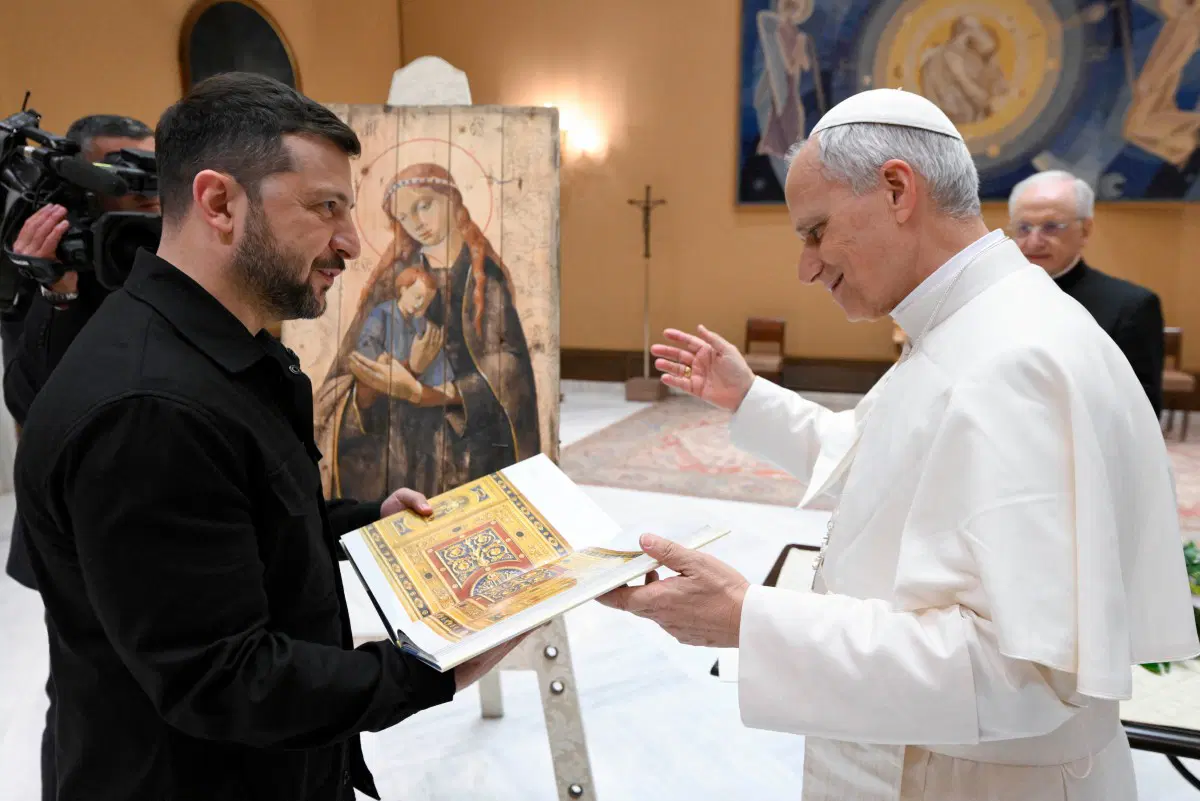
Pope Leo XIV held an audience with US Vice President JD Vance and Secretary of State Marco Rubio at the Vatican on Monday, just a day after the inauguration mass of the new pontiff. The Vatican shared images of Vance and Rubio smiling as they engaged with the Chicago-born pope, who took on the leadership of the world’s 1.4 billion Catholics on May 8.
The meeting with Pope Leo lasted about 45 minutes, according to the spokesperson for the Vice President.
Following the audience, Vance met with Paul Richard Gallagher, the Holy See’s secretary for relations with states, where they had “cordial talks,” as stated by the Vatican. They expressed satisfaction with the positive relations between the US and the Vatican, discussing collaboration between Church and State, as well as topics pertinent to ecclesial life and religious freedom. Additionally, they shared perspectives on current international issues, emphasizing the importance of adhering to humanitarian and international law in conflict zones and advocating for negotiated solutions among involved parties.
JD Vance converted to Catholicism in 2019, and Rubio is also a practicing Catholic. Both officials were amongst the 200,000 dignitaries, royals, and faithful who gathered in St. Peter’s Square to celebrate the official commencement of Leo’s papacy on Sunday, where they waited in line to shake his hand after the mass.
Before his election as pope, Leo had criticized the Trump administration’s policies on migration and had specifically called out Vance on social media. Nevertheless, Vance remarked on Sunday that the United States is “very proud of him,” adding, “Certainly our prayers go with him as he starts this very important work.” He made this statement during a meeting with EU chief Ursula von der Leyen and Italian Prime Minister Giorgia Meloni.
catholic
PAPACY, NOT A RACE ABOUT RACES – By Emmanuel Onwubiko
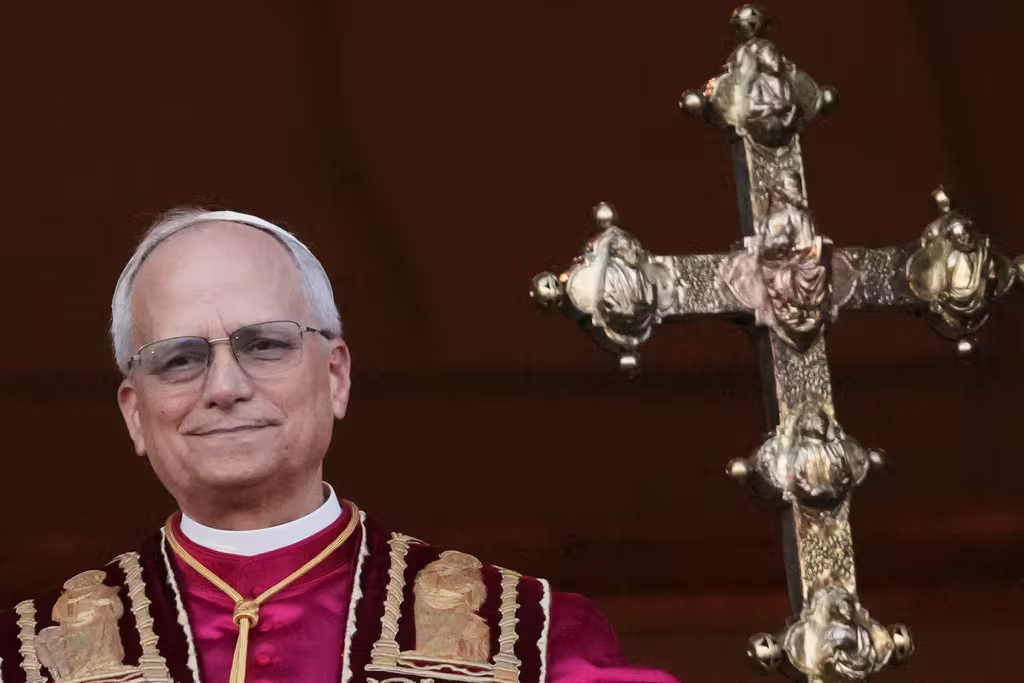
Cardinal Robert Francis Prevost, 69, was elected the new pope under the papal name Pope Leo XIV, making him the first pope from the U.S.
This unprecedented history was made on Thursday, May 8, over an hour after white smoke billowed from the Vatican just after 6 p.m. Vatican time (noon ET), indicating that the new head of the Catholic church had been selected.
Historically, Pope Leo XIV was born in Chicago and attended Villanova University and Catholic Theological Union in Chicago before earning a doctorate in canon law from the Pontifical College of St. Thomas Aquinas in Rome. I read somewhere that he has a degree in Mathematics.
The new Supreme Pontiff was reportedly ordained in 1982( exactly when this writer enrolled into the high school at the Kafanchan Teachers College, in Kaduna state), just as the new pope has reportedly spent much of his clerical life in Peru, serving as Bishop of Chiclayo from 2015 to 2023, reported the National Catholic Reporter.
Before that, he served as a parish pastor and diocesan official in the Augustinian mission beginning in 1985. After a short stint in Chicago in 1987, he returned to Peru. Already, a dubious accusation from a particular European tabloid has emerged that the new Pope, as the Bishop of Chicago, overlooked accusations of child abuses by his priests. The question to ask is How come this accusation only surfaced now that he has been elected by the Church as the new Pope. But many more stories are been told, including many observers who feel disappointed that the new Pope did not come from Africa or that a core progressive did not make it( whatever that means).
The truth is that this new Pope can be said to have thoroughly prepared for his new vocation as the Vicar of Christ given the vast experiences he garnered as a technocrat inside of the Vatican even as the man with the onerous responsibility for appointing Bishops all over the World and then forwarding for approval by the late Pope Francis.
The new Pope was appointed as prefect of the Dicastery for Bishops (formerly known as the Congregation for Bishops) by Pope Francis in 2023, an important role from which he advised the Pope on bishop appointments worldwide. He was also named president of the Pontifical Commission for Latin America in 2023.
The truth is that the new Pope has a very solid background and the other truth is that these wise men who elected him through the inspiration of the Holy Spirit couldn’t have been misled to appoint someone with a baggage, knowing as it were the sophisticated nature of the technology and media of mass communication.
But what really is in a name that made the new Pope opt for the name Pope Leo XIV? The new Pope directly took after Pope Leo X111 just as there is another great inspirational Pope Leo the Great, whose life achievements were phenomenal.
The direct inspiration for the new Pope is said to be Pope Leo XIII (born March 2, 1810, Carpineto Romano, Papal States—died July 20, 1903, Rome) was the head of the Roman Catholic Church (1878–1903) who brought a new spirit to the papacy, expressed in more conciliatory positions toward civil governments, by less opposition to scientific progress, and by an awareness of the pastoral and social needs of the times.
Early career
Vincenzo Gioacchino Pecci was the sixth child of a family of the lower nobility. After his early education in Viterbo and Rome, he completed his studies at the Accademia dei Nobili Ecclesiastici (Academy of Noble Ecclesiastics) in Rome. In 1837, he was ordained a priest and entered the diplomatic service of the Papal States. His superiors immediately appreciated his qualities: flexibility and lucidity and great energy, despite his delicate health. Thus promotions came quickly; he was made delegate (the equivalent of provincial governor) of Benevento in 1838 and was transferred in 1841 to the more important delegation of Perugia. In January 1843, he was appointed nuncio (a papal legate of the highest rank, permanently attached to a civil government) to Brussels and shortly after was consecrated an archbishop.
There is therefore no doubt that the new Pope is indeed a top-quality Pope in the area of courageously defending the mother Church and her doctrines. We will look at the other Pope Leo, who is also one of the greatest of the fathers of the Church.
A scholarly encyclopedia informs us that St. Leo I (born 4th century, Tuscany?—died November 10, 461, Rome; Western feast day November 10 ([formerly April 11]), Eastern feast day February 18) was the pope from 440 to 461, and a master exponent of papal supremacy. His pontificate, which saw the disintegration of the Roman Empire in the West and the formation in the East of theological differences that were to split Christendom—was devoted to safeguarding orthodoxy and to securing the unity of the Western church under papal supremacy.
Consecrated on September 29, 440, as successor to St. Sixtus III, Leo, one of the few popes termed great, immediately worked to suppress heresy, which he regarded as the cause of corruption and disunity. Yet his most significant theological achievement was not his negative suppression of heresy but his positive formulation of orthodoxy.
His treatment of the monk Eutyches of Constantinople provides an example. The monk had founded Eutychianism, an extreme form of monophysitism holding that Christ had only one nature, his human nature being absorbed in his divine nature. Patriarch Flavian of Constantinople excommunicated Eutyches, who then appealed to Leo. After examining the case, Leo sent Flavian (449) his celebrated Tome, which rejected Eutyches’ teaching and presented a precise, systematic doctrine of Christ’s Incarnation and the union of both his natures. In 451, the Council of Chalcedon (modern Kadikoy, Turkey), summoned to condemn Eutychianism, declared that Leo’s Tome was the ultimate truth. Furthermore, the council recognized Leo’s doctrine as “the voice of Peter.” Thus, for the church, Leo’s Tome established the doctrine that Christ’s natures coexist and his Incarnation reveals how human nature is restored to perfect unity with divine, or absolute, being. (https://www.Britannica.com).
The above qualitative attributes of Pope Leo the Great provide some information on the inspirational standards that the new Pope intends to exemplify. He has started well by affirming that his mission is to be a true Vicar of Christ.
Hear him: “Peace be with all of you!
Dearest brothers and sisters, this is the first greeting of the Risen Christ, the good shepherd who gave his life for God’s flock. I too, would like this greeting of peace to enter your heart, to reach your families, to all people, wherever they are, to all peoples, to the whole earth. Peace be with you!
This is the peace of the Risen Christ, an unarmed and disarming peace, humble and persevering. It comes from God, God who loves us all unconditionally. We still have in our ears that weak but always courageous voice of Pope Francis, who blessed Rome!
The pope who blessed Rome gave his blessing to the world, to the entire world, that Easter morning.
Allow me to follow up on that same blessing: God cares for us, God loves all of us, and evil will not prevail! We are all in God’s hands. Therefore, without fear, united hand in hand with God and among ourselves, let us move forward.
We are disciples of Christ. Christ goes before us. The world needs His light. Humanity needs Him as the bridge to reach God and His love.
Help us too, then help each other to build bridges – with dialogue, with encounter, uniting all of us to be one people always in peace. Thank you, Pope Francis!
I also want to thank all the fellow cardinals who chose me to be the Successor of Peter and to walk with you, as a united Church always seeking peace, justice, always trying to work as men and women faithful to Jesus Christ, without fear, to proclaim the Gospel, to be missionaries.
I am a son of Saint Augustine, (an) Augustinian, who said: “With you I am a Christian and for you a bishop.” In this sense, we can all walk together towards that homeland that God has prepared for us.
To the Church of Rome, a special greeting! We must seek together how to be a missionary Church, a Church that builds bridges (and) dialogue, always open to receive (people), like this square, with open arms – everyone, all those who need our charity, our presence, dialogue and love.
(Switching into Spanish) And if you allow me also, a word, a greeting to all those, and particularly to my beloved diocese of Chiclayo, in Peru, where a faithful people have accompanied their bishop, have shared their faith, and have given so much, so much to continue being a faithful Church of Jesus Christ.
(Switching back to Italian) To all of you, brothers and sisters of Rome, of Italy, of the whole world, we want to be a synodal Church, a Church that walks, a Church that always seeks peace, that always seeks charity, that always seeks to be close, especially to those who suffer.
Today is the day of the Supplication to Our Lady of Pompeii. Our Mother Mary always wants to walk with us, to stay close, to help us with her intercession and her love.
So I would like to pray together with you. Let us pray together for this new mission, for the whole Church, for peace in the world, and let us ask for this special grace from Mary, our Mother,” he concluded.
Philosophers say that the first step in everything is the most important. Analytically, the Pope’s first speech shows the blueprint of a Papacy that would truly represent Jesus Christ on earth and as Catholics, our obligation is to pray for our Holy Father so that God would make him remain true to his calling as the Vicar of Jesus Christ on earth. This is what matters and not the banality of seeking to pigeonhole the new Pope as an American Pope or to recall the disappointment of those who had expected that an African or Asian Pope would emerge or even the Italians that actually thought that it is the time of Italy to produce a Pope which hasn’t happened in about 47 years back or more.
Many who are true Roman Catholics know that the election of the Pope is not a race of races.
In a report titled: “New Pope’s Race Unimportant, Africans Say,” written on February 12, 2013 9:11 AM By Nancy Palus for Voice of America radio, it was disclosed that Pope Benedict XVI resignation triggered anew the question of whether it is time for a non-European pope – notably a black African, after centuries of European popes, mostly Italian. But Catholics in Senegal and Ghana say they see the leader’s race as largely irrelevant.
“For us in the Catholic Church, it does not play any role at all and it should not play any role at all,” said Gabriel Charles Palmer-Buckle, archbishop of Accra, the capital of Ghana. “The word Catholic means that all cultures, all races, all peoples are united in one body, so it shouldn’t play a role whether the person is black, white, or yellow.”
Cardinal Théodore Adrien Sarr, archbishop of Dakar, will be among the cardinals to elect the next pope. Speaking to reporters on Monday, he said it’s not the pontiff’s ethnicity that counts but his strength and conviction to lead the Church.
He said he has his doubts that the moment has come for a black African pope.
He says this question has been with us for a long time now. “Is the Catholic Church ready for a black African leader? Is the world ready for a black African pope? I’ve got my doubts,” he says. “It’s true – we’ve got the case of Barack Obama.” Still, he says, given how Africans are generally seen and treated, it is not very likely.
Dominique Basse, a member of the Church of Uganda’s Martyrs in Dakar, says having a black African pope would certainly enhance Africa’s place in the world. ” It’s like when a president who’s of your party comes to power,” he says, “it enhances your group. But what’s most important is that the new Pope be able to help us all grow in our faith and be able to strengthen the Catholic community.”
On Monday, as parishioners gathered for a daily mass at the Church of Uganda’s Martyrs, a few chatting about Pope Benedict’s resignation said they saw the decision as wise and noble.
But for some, Basse said, Africa’s culture of chiefdom remains a strong force, and they were put off by the pope’s move.
He says for some, the decision is troubling, provoking questions about what might have been behind it. Basse says some people are still quite attached to the concept of a chief and the chief does not step down.
At the second special assembly of bishops on Africa, in 2009, Pope Benedict talked about the role of the church as the continent faces religious fundamentalism, poverty, injustice, and war. He said part of the church’s calling is to reconcile different ethnic, linguistic and religious groups.
Bishop Palmer-Buckle of Accra says while Africa has particular challenges and it is important to discuss them in such assemblies, the Catholic Church is not about serving only certain “constituencies”.
“I don’t think that’s what the Catholic Church is about,” he says. “The pope is definitely going to be a universal spiritual leader for the whole world. And he must be as concerned about Africa as he would be concerned about Europe as he would be concerned about Latin America or Asia.”
So just as these Africans said since 2013, we as Roman Catholics are more concerned about the holiness, pursuit for social justice, speaking for the poor, migrants, underprivileged and defending the Gospel of Christ Jesus, are exactly the genre of Pope that we need and not about his race, his tongue, his tribe or his class stratification.
EMMANUEL ONWUBIKO is the founder of the HUMAN RIGHTS WRITERS ASSOCIATION OF NIGERIA and was NATIONAL COMMISSIONER OF THE NATIONAL HUMAN RIGHTS COMMISSION OF NIGERIA
-

 News10 months ago
News10 months agoNUJ FCT Council Mourns The Loss of Senior Journalist, Isaiah Abraham
-
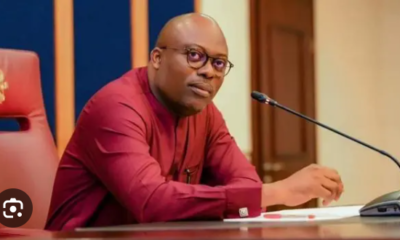
 News10 months ago
News10 months agoHURIWA Declares Governor Fubara’s Emergence as Divine, Urges Support for Rivers State’s Progress
-
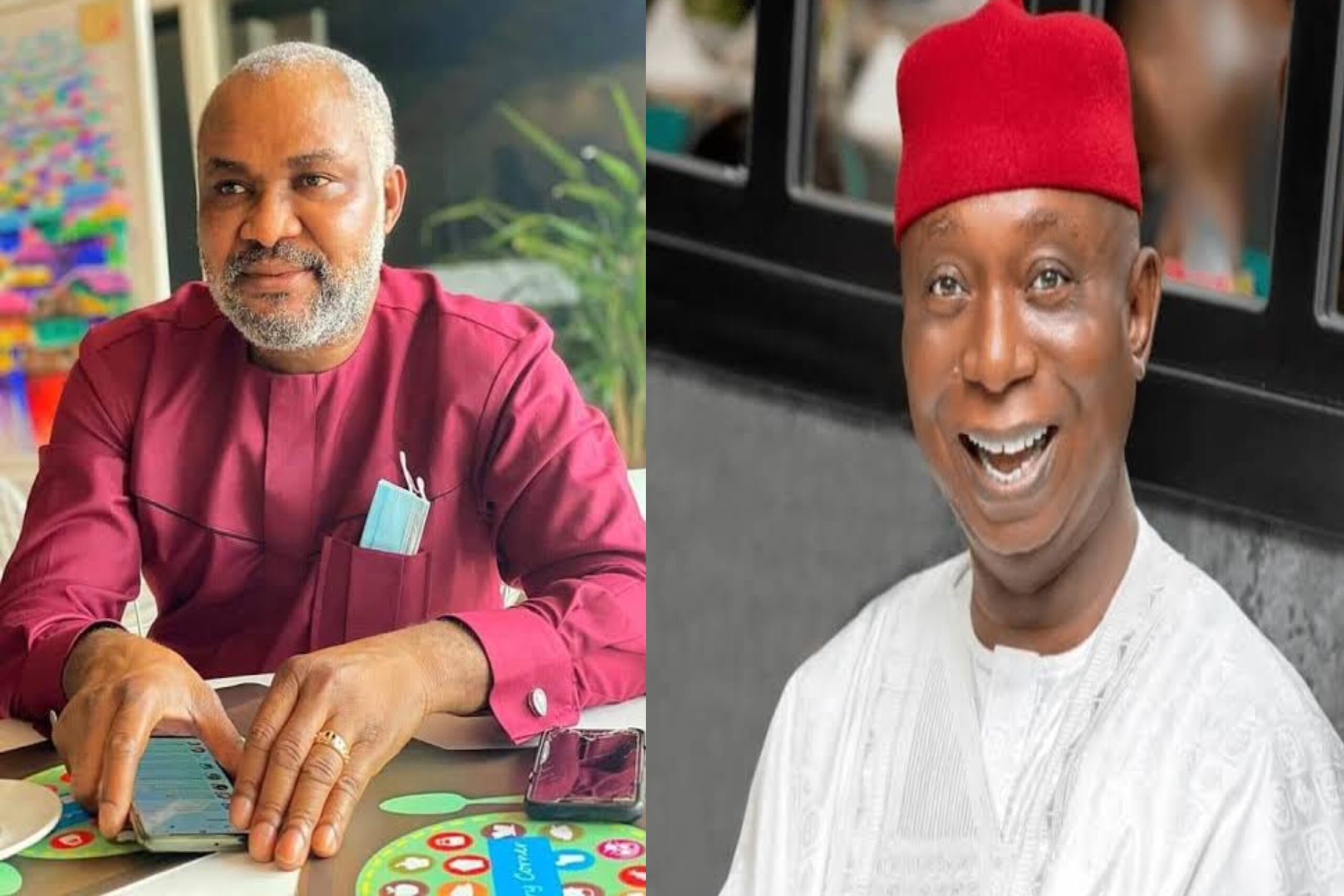
 News10 months ago
News10 months agoAnioma State as panacea to South-East marginalization – By Emmanuel Onwubiko
-

 Opinion8 months ago
Opinion8 months agoNIGERIAN WOMAN IN DIASPORA, CULTURAL SHOCKS – By Stacey Ukaobasi Onwuegbuchulam
-
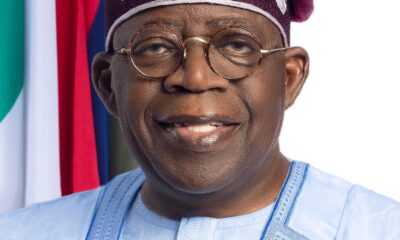
 News11 months ago
News11 months agoHURIWA Blames Serial Stampedes on Weaponized Poverty, Warns of Nigeria’s Rapid Decline
-
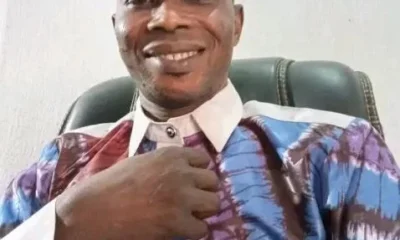
 News10 months ago
News10 months agoJealous Husband Stabs Nigerian Bishop To Death Over Suspicion Of Sleeping With Estranged Wife
-
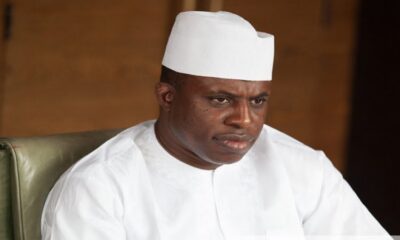
 News10 months ago
News10 months agoTinubu sympathizes with ex-speaker Bankole on the death of his mother
-
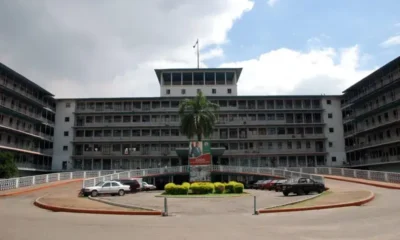
 Health8 months ago
Health8 months agoA complete list of 154 healthcare facilities across Nigeria that provide free emergency obstetric care and VVF (Vesico-Vaginal Fistula) surgeries.


